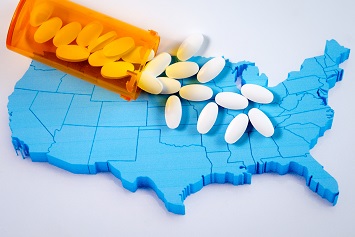The National Safety Council (NSC) urged President Donald Trump and Vice President Joe Biden to include opioid overdose prevention as part of their coronavirus disease 2019 (COVID-19) recovery plans. COVID-19 is a respiratory disease caused by infection of the SARS-CoV-2 virus.
The NSC also urged the candidates to discuss their strategies around prevention, treatment, and the employers’ role in addressing opioid misuse during their September 29 debate in Cleveland, Ohio. The state has been decimated by the opioid epidemic, according to the NSC. The group had questions about how the candidates would address the opioid epidemic, including how each candidate would support employers working to prevent opioid misuse and supporting their employees in treatment and recovery.
“A national plan to combat the overdose crisis must be part of the broader national strategy to recover from this pandemic and continue after a vaccine is widely deployed,” Jenny Burke, the NSC’s senior director for impairment issues, said in a statement.
The group pointed to a recent study indicating that people with substance use disorders are more susceptible to COVID-19 and its complications.
Ultimately, this issue was not discussed during the debate.
The NSC stated in its letter to the presidential candidates that in June, 40% of U.S. adults reported struggling with mental health or substance use issues, and 13% reported starting or increasing substance use. The group called opioid overdose the single worst drug crisis in U.S. history and said that the coronavirus pandemic is exacerbating the problem.
A decrease in overdose fatalities in 2018 was reversed in 2019, according to the NSC, with preliminary numbers showing a record high of 50,000 fatal opioid overdoses last year. The NSC and a group of companies and organizations offered a National Plan to Address Opioid Misuse for any candidate to use to address opioid misuse in the United States.
The National Plan contains specific recommendations for employers that include:
- Both accommodating employees who are prescribed opioids and enhancing existing drug-free workplace policies to include policies for employees with opioid use and other substance use disorders so they can support employees to return to work during and following treatment;
- Educating managers and supervisors about the signs of opioid misuse so employers can spot symptoms early;
- Having naloxone on-site to counter the effects of opioid overdoses and ensuring that emergency response staff members are trained on how to administer it;
- Expanding employee assistance programs (EAPs) to provide barrier-free preventive services, screening and early identification services, short-term counseling, referral to specialty treatment, and other behavioral health interventions related to opioid use and misuse;
- Expanding health insurance benefits to ensure coverage of non-opioid pain treatment options, including but not limited to non-opioid pharmacology and physical and occupational therapy;
- Ensuring coverage of evidence-based treatment for opioid use disorders and addressing other disparities and gaps in healthcare benefits; and
- Supporting a stigma-free, recovery-friendly workplace culture.
The plan also included recommended prevention, treatment, and recovery efforts, along with widespread availability of naloxone. The plan’s authors included several state safety council chapters, along with The Ad Council, Southwest Airlines, Students Against Destructive Decisions (SADD), and U.S. Steel.

